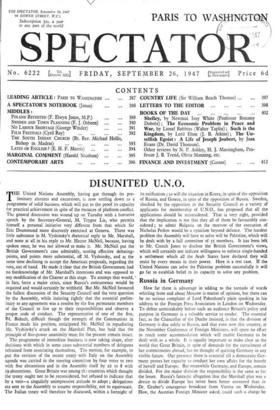DISUNITED U.N.O.
THE United Nations Assembly, having got through its pre- liminary alarums and excursions, is now settling down to a programme of solid business which will put to the proof its capacity for practical achievement in spite of the menaces of platform conflict. The general discussion was wound up on Tuesday with a hortative speech by the Secretary-General, M. Trygve Lie, who permits himself a personal initiative very different from that which Sir Eric Drummond more discreetly exercised at Geneva. There was little substance in M. Vyshinsky's rhetorical reply to Mr. Marshall, and none at all in his reply to Mr. Hector McNeil, because, having spoken once, he was not allowed to make it. Mr. McNeil put the British Government's case admirably, scoring effective debating- points, and points more substantial, off M. Vyshinsky, and at the same time declining to accept the American proposals, regarding the veto, out of hand. He made it clear that the British Government had no foreknowledge of Mr. Marshall's intentions and was opposed to any modification of the Charter at this stage. To attempt that would, in fact, force a major crisis, since Russia's concurrence would be required and would certainly be withheld. But Mr. McNeil favoured the fullest discussion of the Security Council and the veto question by the Assembly, while insisting rightly that the essential prelim- inary to any agreement was a resolve by the five permanent members of the Council to live up to their responsibilities and observe a proper code of conduct. The representative of one of the five,
Bidault, difficult though the strength of the Communists in France made his position, anticipated Mr. McNeil in repudiating Mr. Vyshinsky's attack on the Marshall Plan, but held that the principle of five-power unanimity must for the present remain intact. The programme of immediate business is now taking shape, after decisions with which in some cases substantial numbers of delegates refrained from associating themselves. The motion, for example, to -put the revision of the recent treaty with Italy on the Assembly agenda was carried in the steering committee by four votes to two with five abstentions and in the Assembly itself by 22 to 8 with 19 abstentions. Great Britain was among th! countries which thought the treaty ought not to be reconsidered, but refused to indicate that by a vote—a singularly unimpressive attitude to adopt ; delegations are sent to the Assembly to assume responsibility, not to equivocate. The Italian treaty will therefore be discussed, within a fortnight of
its ratification ; so will the situation in Korea, in spite of the opposition of Russia, and Greece, in spite of the opposition of Russia. Sweden, shocked by the opposition in the Security Council to a variety of applicants for membership of U.N.O., has proposed that all the applications should be reconsidered. That is very right, provided that the implication is not that they all of them be favourably con- sidered ; to admit Bulgaria on the morrow of the execution of Nicholas Petkov would be a cynicism beyond defence. The hardest problem the Assembly will have to solve will be Palestine, which will be dealt with by a full committee of 55 members. It has been left to Mr. Creech Jones to disclose the British Government's views, which will certainly not indicate willingness to enforce single-handed a settlement which all the Arab States have declared they will resist by every means in their power. Here is a test case. If the United Nations can solve the Palestine problem successfully it will go far to establish belief in its capacity to solve any problem.


































